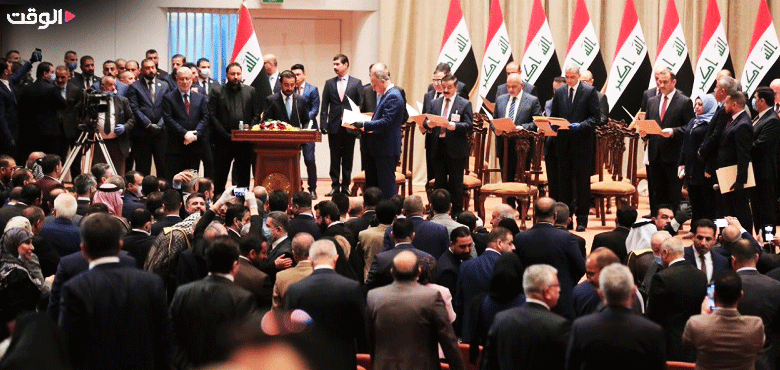Alwaght- A week after surprising parliamentary election results were announced and proved confusing and divisive to the political parties and leaders who were supposed to start the consultations to form a new government, the groups protesting the “manipulated” results are united under Shiite Coordination Framework (SCF) to make their voice stronger in push to influence the political developments. To this end, last week, the SCF said that it is not participating in any negotiations on a new cabinet before a showdown over the disputed election.
The SCF consists of all Shiite forces excluding Muqtada al-Sadr-led Sadrist Movement. Although formed for pre-election period, the framework seems to live on in the next political stage and play a crucial role in formation of the new cabinet, especially that its total parliamentary seats outnumber those of the Sadrist Movement that was put first by the results released by the Independent High Electoral Committee (IHEC).
This sends clear messages about the complexity of the cabinet formation process and the possibility of prolonging the formation of a new government. The question now is whether withdrawing from the talks would be a sign of complete opposition to the results and an attempt to nullify the results, or a temporary measure to further examine the conditions and tools of pressure to moderate the monopolistic tendencies of the victorious parties.
"The majority of the partners are not finding a way to overcome the electoral crisis, but they reject it in any way …. if legal and popular ways fail, we will have a long-term plan," a Fatah leadership member said in comments.
This, many agree, means that Iraq can move from a shock stage to a labyrinth political horizon after the substantially-questioned vote result.
Another question is that whether discontentment with the results can lead to formation of an independent bloc with adequate power and seats to form a new cabinet.
Mohammed al-Sayhoud, a member of the former Prime Minister Nouri al-Malikl-led State of Law alliance, said that alliance within a number of Shiite blocs and the independents could form a majority and then agree with the Kurds and Sunnis to form a government.
The Iraqi constitution refers to the granting of the right to form a government to the largest parliamentary bloc, as stated in the first clause of Article 76: “The President of the Republic shall charge the nominee of the largest Council of Representatives bloc with the formation of the Council of Ministers within fifteen
days from the date of the election of the President of the Republic.”
Having this in mind, there can be three scenarios about the possible coalitions forming the government.
First scenario which is the most possible scenario refers to coalition of the winners. According to this scenario, the top victorious parties, Sadrist Movement, Kurdistan Democratic Party, and Progress Party, will form the majority bloc in the new parliament. Although this scenario is likely given the positive signals exchanged among these parties about the home policy, their alliance is yet shrouded in ambiguity. Esam Hussein, a member of the Sadrist Movement, told The Independent news website’s Arabic version that the movement formed a negotiation team but has not talked to any side yet and there are no signs of coalition.
The second scenario raises the possibility of emergence of a new bloc comprised of the Shiite forces, the Sunnis, and the Kurds.
This scenario also seems to have a slim chance for reasons such as the possibility of tensions in the Iraqi political scene due to the power and popularity of the Sadrists. But given the power of SCF, like choosing not to participate in cabinet talks, the bloc is still influential.
Third scenario is Sadr’s entry to a coalition government given birth to by a “majority bloc.” This scenario, like the second one, is not easy to consider mainly because Sadr looks forward to a transformational government and thus finds alliance with the traditional forces damaging to his vote base.
Now it remains to wait and see to which scenario the post-election uproar leads the country. Will there be new surprises or possible alliances? Stability or turbulence?



























